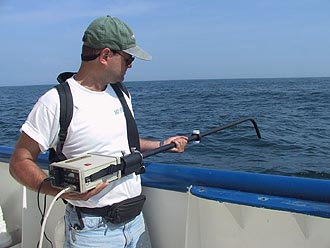|  |  | |  |

|  |  |  |  |  | The Path That Nearly Wasn't Followed
|
10.14.04
|
Who Are NASA's Earth Explorers?
The elementary school student questioning if El Niño occurs anywhere besides the Pacific Ocean. The researcher investigating connections between Arctic ozone depletion and global climate change. The citizen scientist interested in how changing land cover and use affects animal migration patterns. And the businessperson projecting future needs for harvest, delivery and storage of crops. All of these people are Earth Explorers -- they are all connected by their curiosity about Earth system processes. This monthly series will introduce you to NASA Earth Explorers, young and old, with a variety of backgrounds and interests.
Nominate an Earth Explorer!
Tell us about Earth Explorers you know! We're looking for students, teachers, scientists and others who are working with NASA Earth science data and imagery to better understand our home planet. Send your nominations to Dan Stillman:
dan_stillman@strategies.org.
|

|
When Carlos Del Castillo found out he was prone to severe seasickness, a career in ocean exploration seemed a long shot.
Image to right: Carlos gathers data about the water. Credit: NASA
During his first research cruise, Del Castillo discovered -- with horror -- that the motion of the boat did not sit well with his body. However, after reconsidering his career and undergoing a few very distressing days, he recovered and was able to work at sea.
Del Castillo, currently the program scientist for Ocean Biology and Biogeochemistry at NASA Headquarters, still gets a bit squeamish in rough weather, but has managed to overcome his condition. Enough so that he recently received a Presidential Early Career Award for Scientists and Engineers for his research in ocean biology.
The award, issued by the National Science and Technology Council at a White House ceremony in September, recognizes exceptional potential for leadership in science research and represents the highest honor bestowed by the U.S. government on scientists and engineers in the early stages of their careers.
Born in San Juan, Puerto Rico, Del Castillo has spent most of his life on or near the ocean.
"My first vehicle, unlike most kids, was not only a bike, but a small sailboat," Del Castillo said. "My love for the ocean has always played a great role in my life."
After earning a bachelor's degree in biology and a master's degree in marine science, both from the University of Puerto Rico, Mayaguez, Del Castillo transferred to the University of South Florida in order to pursue a Ph.D. in oceanography.
The presidential award wasn't Del Castillo's first. In 1999, he was awarded the Sackett Prize for Innovative Research for his work at USF, which included research in oceans and rivers around the globe. One of the things Del Castillo enjoyed about his education was the chance to see different parts of the world.
"I think I've been very lucky in the course my studies have taken me," Del Castillo said. "One thing led to another, and eventually I completed my doctoral studies after working in the Eastern Caribbean, the Arabian Sea and the Gulf of Mexico."
Del Castillo started with NASA in 2000 at the Stennis Space Center, where he conducted research on the transport of carbon by the Mississippi River plume and the application of space-based remote sensors to studying coastal environments.
His book, "Remote Sensing of the Coastal Environment," co-edited with two other scientists, will be published later this year.
See previous Earth Explorers articles:
+ View site
Related Resources
Ocean World
+ View site
Visit to an Ocean Planet CD-ROM
+ View site
Adapted from NASA Press Release 04-308
Edited by Dan Stillman, Institute for Global Environmental Strategies
|
|  |
|
